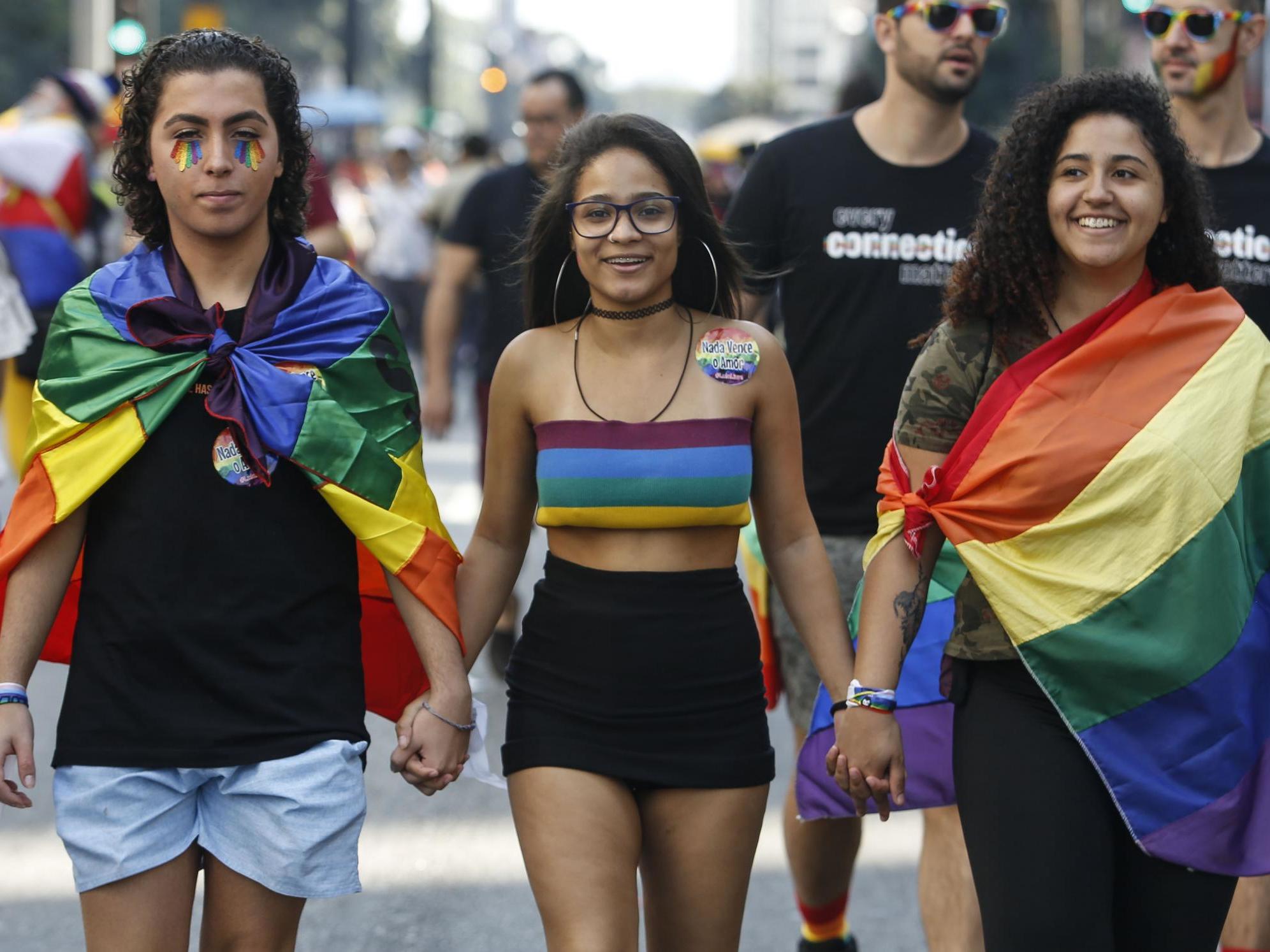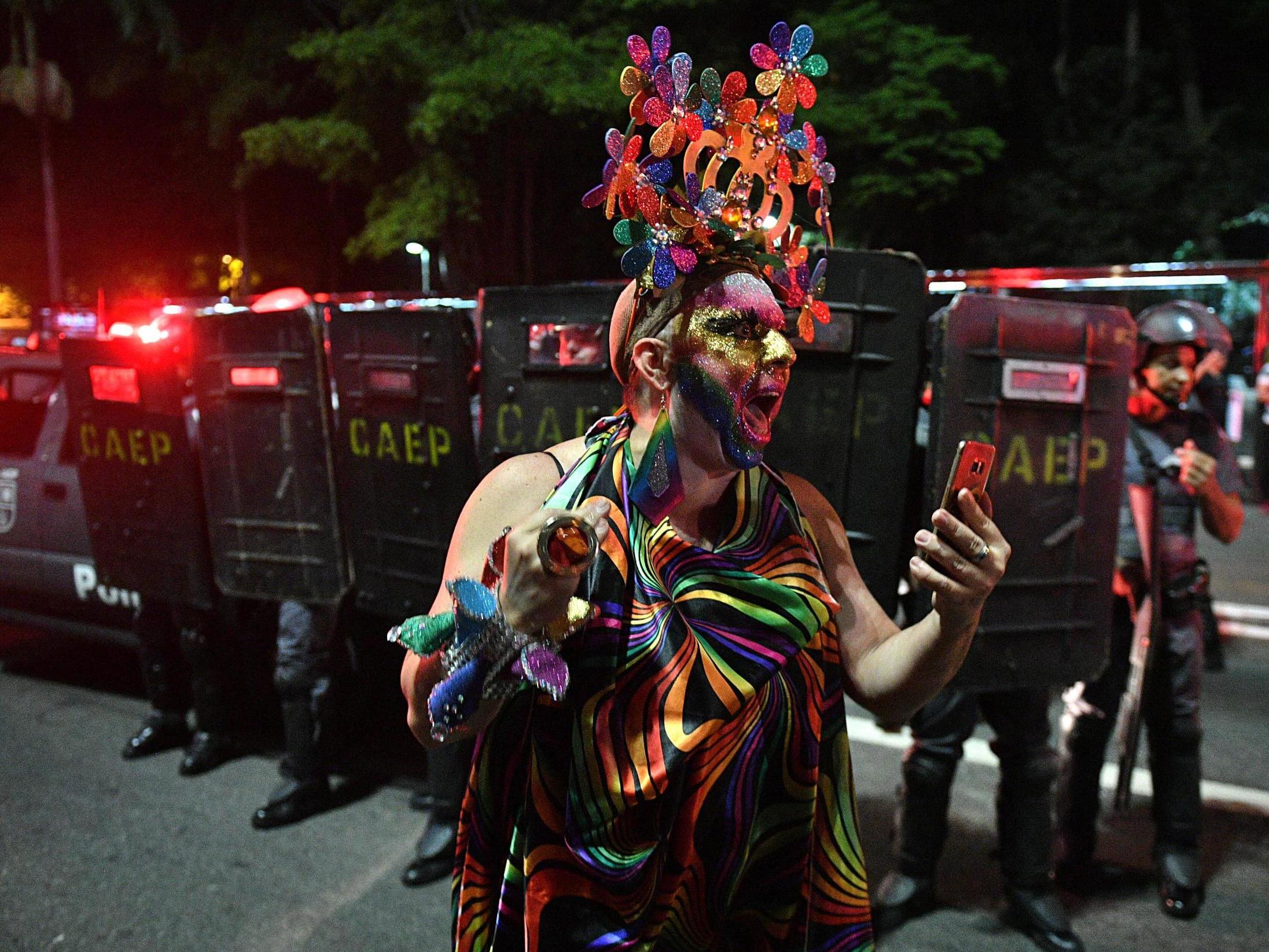Brazil’s LGBT+ community don’t trust Bolsonaro to keep them safe, so they’re learning to protect themselves
Enduring death threats, violent attacks and homophobic remarks from their own leader, as one said: 'The country has changed, Brazil is a homophobic country now'

Your support helps us to tell the story
From reproductive rights to climate change to Big Tech, The Independent is on the ground when the story is developing. Whether it's investigating the financials of Elon Musk's pro-Trump PAC or producing our latest documentary, 'The A Word', which shines a light on the American women fighting for reproductive rights, we know how important it is to parse out the facts from the messaging.
At such a critical moment in US history, we need reporters on the ground. Your donation allows us to keep sending journalists to speak to both sides of the story.
The Independent is trusted by Americans across the entire political spectrum. And unlike many other quality news outlets, we choose not to lock Americans out of our reporting and analysis with paywalls. We believe quality journalism should be available to everyone, paid for by those who can afford it.
Your support makes all the difference.Miguel Doldan couldn't get the thought out of his head: People wanted him dead.
The passersby on the streets, the riders on the bus – they looked friendly, but many of them, he often reminded himself, had voted for Jair Bolsonaro, the right-wing politician who said he'd rather have a dead son than a gay one.
Brazil was no longer the country he thought it was. And Doldan – a transgender man increasingly aware that he was only 5 feet 4 inches tall and 121 pounds – needed to learn how to fight.
He found what he was looking for down a darkened street in central Rio, where the only light one recent evening came from an open-air gym.
There was a group of a dozen or so people – gay or transgender all – who were training to meet the violence they increasingly fear they're likely to face in Bolsonaro's Brazil.
In a country with one of the world's highest rates of violence against gay and transgender people, where social media is deluged with homophobic rants, some LGBT+ people no longer trust the state to protect them – and are now taking personal defence into their own hands.
Martial arts classes for LGBT+ people are being taught in some of the country's biggest cities – in Rio, Sao Paulo and Porto Alegre. Some in the community say they've considered arming themselves.

"The country has changed," said Doldan, 28. "Before, there was a sense that there were institutions that could help you. Judges, police, justice officials – you could rely on them. But now people feel comfortable saying things they wouldn't have before and more comfortable doing things they used to not."
A chasm has opened in Brazil between how gay people are treated on paper and how some are treated in reality.
Its supreme court just criminalised homophobia. Television shows now regularly feature gay and transgender themes. A federal university announced this month that it will begin offering 120 admissions slots to transgender people to increase diversity.
But 167 transgender people were killed here between October 2017 and October 2018, more than double any other country, according to Transgender Europe, a network of organisations that advocates for the transgender community.
The president regularly makes homophobic remarks: "Brazil can't be a country of the gay world," Bolsonaro said this spring. "We have families."

And one of the country's most prominent gay people, the American journalist Glenn Greenwald, has been targeted with homophobic attacks and death threats since he began publishing a series of investigative articles focusing on Bolsonaro's justice minister.
In a way, the LGBT+ self-defence courses are weaving together all of these disparate social threads – showcasing a community secure enough in Brazilian life to take on the backlash, despite pervasive fears, rather than relinquish hard-fought gains.
"LGBT+ people in Brazil didn't feel safe in the past, and we don't feel safe now, but now the feeling is that this could be our future," said Felipe Brandão Daier, an attorney with the Center for Reference and Defence of Diversity, a publicly funded organisation in Sao Paulo that serves the gay community.
"It's because of Bolsonaro. But Bolsonaro was elected because Brazil is a homophobic country."
That's what spurred Carlos Renan dos Santos Evaldt, a banker who is the president of a gay sports club in Porto Alegre, to start offering jujitsu classes earlier this year. During the divisive election campaign, he watched with concern as allegations of hate crimes ticked upward in parts of the country.
Homophobic slurs and threats inundated social media. And Bolsonaro joined in.
So he wanted his club to start offering classes in fighting. But it took him four months to find a gym that would allow the classes to move forward. "They said it was a public they weren't interested in," he said. "When we explained it was simply an LGBT group, they simply said they didn't want us."
It was only after he found an instructor who'd committed herself to teaching vulnerable groups how to fight that classes began. At stake was not only personal safety, he said, but "rights achieved through hard work and at the cost of many lives and years".
It's a message that resonated with Doldan, who said he's able to recognise himself as a transgender man only because of those rights.
Growing up in the small town of Eldorado in the western state of Mato Grosso do Sul, he'd always known he wasn't like other girls, but he didn't have the vocabulary to express it. He had no idea what was a transgender person was.
"If you don't have a word for it, it's like it doesn't exist," he said. "I feel, in a certain way, if I don't have a word to explain what I am, than I don't exist."
He gained a better understanding of his identity when he found a story of an American transgender man online. "When I read his story, I read mine," he said.
When he left Eldorado for college, he introduced himself to new acquaintances as Miguel. And that's how he's known in Rio, too.
In the neighbourhood of Botafogo, a largely progressive community in south central Rio, he felt safe. He trusted that the people here were tolerant – that he wasn't in Eldorado anymore.
But his sense of security was shattered in October, when he went to the polls to vote. He saw all sorts of people – young, old, people he passed every day on the street without a second thought – wearing pins supporting Bolsonaro.
"Either those people didn't understand [Bolsonaro's] ideas, or they were okay with them," he said. "And I started to feel like anyone could be a threat – not just a guy who looks menacing. It's, like, everyone could hate me, and they think it would be okay if someone could attack me."
It's a fear he can't dislodge. So twice a week, he comes to this gym on a darkened street, learning how to use leverage, how to shift his weight, growing to believe he might stand a chance if that attack ever did happen.
"I feel a little different," he said. "I'm not sure if I can defend myself, but at least now I know what to do."
The Washington Post
Join our commenting forum
Join thought-provoking conversations, follow other Independent readers and see their replies
Comments